|
 Secure Site
Secure Site
|
 |
Archive for September, 2012
 Japanese Ukiyoe Crane - Meditation Helps Us with More than Just Stress Meditation is not just for relaxation; its primary purpose is to develop the capacity to respond skillfully and gracefully to life’s difficulties as well as its joys. We have to reflect deeply on the uncertainty and brevity of our lifespan. Contemplate the fact that all the things in which we place our trust are contingent and constantly changing. We have to use our spiritual practice to look within and discover the heart of our being.
adapted from Natural Solutions Magazine by Shyalpa Tenzin Rinpoche, 3/2012
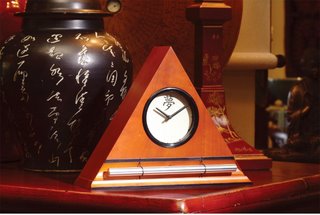 Meditation Timers and Soothing Chime Alarm Clocks Now & Zen – The Zen Chime Alarm Clock Store
1638 Pearl Street
Boulder, CO 80302
(800) 779-6383
Posted in Meditation Timers, Meditation Tools, mindfulness practice, Well-being
 Reduce Stress... We don’t need researchers to tell us that stress is rampant in the US. But in its 2009 Stress in America study, the American Psychological Association found that 24 percent of adults are experiencing high levels of tension—and 42 percent of us were more stressed out last year than the previous year. And it’s not just because of the recession, traffic jams, and rat-a-tat pace of grim news headlines—it’s how we handle the challenges of daily life. “Western cultures are more and more isolating to the individual, and families are moving far distances from each other, so we’re increasingly in the position to manage our stress in isolation,” says Jill Evenson, ND, president of the Wisconsin Naturopathic Physicians Association. “We are faced with so many decisions and choices that we must engage in the short-term stress response frequently, and there is little opportunity for things to return to the state of rest.”
Over time, these short-term stress responses can pile up to produce a state that New York City’s Roberta Lee, MD, author of The SuperStress Solution (Random House, 2010), calls “superstress”—a chronic illness that taxes nearly every part of your body, from your decision-making processes to your bones, liver, and cells. “You get headaches, your libido drops, your memory goes, and you’re excessively tired,” says Lee, listing some of the more common stress symptoms.
Even more serious, stress can wreak havoc on your cardiovascular and immune systems. “Stress, by far, is one of the biggest things that gets in the way of your health,” says Michael Smith, ND, of the Carolinas Natural Health Center in North Carolina. “And most of us don’t realize just how stressed we really are.”
 Experts shed light on stress Here, experts shed light on that fight and what you can do to win the stress battle naturally.
Breathe. “It can be as simple as three long breaths while sitting at your desk,” says Smith. “That oxygen is going to help nourish your body—your muscles and organs—and provide stress relief.” Slow, relaxed breathing calms the autonomic nervous system, producing more energy, better immune function, and lower blood pressure. Start aiming for 25 deep breaths a day; whenever you notice the clock tick forward to another hour, take three long breaths.
Move more (even a little bit). “Even though exercise stresses, or challenges, your body, it does so in a nourishing way,” says Evenson, explaining that exercise lowers levels of norepinephrine/epinephrine (adrenaline), helping turn off the sense of alarm you get when these chemicals are present. Your lungs also receive more oxygen, the muscles get nutrients, and the immune system “cleans house,” thanks to muscle contractions that move lymphatic fluid back to the organs of elimination, helping your digestive system and metabolism. But you don’t have to grumble through a lifeless exercise routine at the gym. “My personal favorite is dancing,” says Evenson. Also, try parking in the farthest spot from the grocery store or office door to increase how many steps you take per day. Or set a goal of doing 100 push-ups and 100 sit-ups each day. Start with 25 of each exercise (perform push-ups with your knees on the floor, if necessary) and add 5 more of each every day to help reach that goal.
Try yoga and meditation. Numerous studies have shown that yoga, meditation, and other mind-body techniques can relieve stress. Massachusetts researchers from the Benson-Henry Institute for Mind/Body Medicine recently found that yoga, meditation, and similar therapies such as repeated prayer actually change the way our genes behave in response to stress.
Our Yoga Clocks & Meditation Chime Timers feature a long-resonating acoustic chime that brings the meditation session to a gradual close, preserving the environment of stillness while also acting as an effective time signal. (Now & Zen, $124.95)
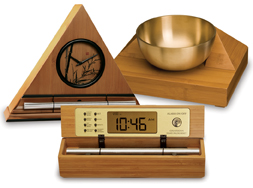 Yoga Clocks & Meditation Chime Timers adapted from Natural Solutions Magazine, 5/2010 by – Sarah Tuff
Now & Zen’s Yoga Clock & Meditation Chime Timer Store
1638 Pearl Street
Boulder, CO 80302
(800) 779-6383
Posted in Bamboo Chime Clocks
 Lack of Sleep Although the occasional all-nighter is OK, people who regularly skimp on z’s can’t undo sleep deprivation’s detrimental effects by simply hitting the snooze button on weekends, says a new study in the journal Science of Translation Medicine. Contrary to popular belief, the energy you feel after a Saturday morning sleep session is only short lived, according to the study. Chronic sleep loss has a cumulative effect on performance.
Why? Lack of sleep raises levels of the stress hormone cortisol and affects a person’s ability to respond to stimuli, says Catherine Darley, ND, founder of Seattle’s Institute of Naturopathic Sleep Medicine. Sleep also plays a key role in mood regulation and overall physical and mental functioning. If you need some extra help falling asleep, try a natural insomnia supplement made with melatonin, tryptophan, or valerian.
Remember,waking up in the morning should be as pleasant as falling asleep at night. The Zen Alarm Clock’s gradual, gentle awakening is transformative. “The Zen Alarm Clock,” uses soothing acoustic chimes that awaken users gently and gradually, making waking up a real pleasure. What makes this gentle awakening experience so exquisite is the sound of the natural acoustic chime, which has been tuned to produce the same tones as the tuning forks used by musical therapists. According to the product’s inventor, Steve McIntosh, “once you experience this way of being gradually awakened with beautiful acoustic tones, no other alarm clock will ever do.”
 Waking in the Morning, Kitagawa Utamaro, Komuraski of the Tamaya, House After a Bath, 1795 adapted from Natural Solutions Magazine By Stacy Lindsay, 8/2010
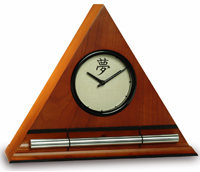 Gradual, Soothing Chime Alarm Clocks
Now & Zen – The Zen Alarm Clock Store
Chime Alarm Clocks with Progressive Awakening
1638 Pearl Street
Boulder, CO 80302
(800) 779-6383
Posted in Bamboo Chime Clocks, Now & Zen Alarm Clocks, sleep, Sleep Habits
 Meditation It is a misconception that meditation is difficult
“Everyone says I should meditate. All spiritual books end with the advice to take time for meditation. But no one tells you how!” The young man who stood before me was completely stressed out. For months he had been trying to meditate but the more he tried, the more he failed. And now he was dumping his frustrations on me because I had just given a lecture on the importance of… meditation.
I got what he was saying. People often turn meditation into something really complex. For instance, some say when you meditate your expression should be very serious and holy as you try to curl the tip of your tongue back against the roof of your mouth while reciting an incomprehensible mantra in your mind. Or you should sit in such a way that you’re just about breaking your back, as well as your calves and knees, while rising above the pain by focusing on your breath. Or you should sit in front of a statue of an Indian god or goddess with an unpronounceable name and tune in so you can be transported to an unpronounceable place.
Is meditation really so complex? Do you really have to contort yourself to bring your mind to rest and come into the here and now? I don’t think so. Most animals and children do nothing else. It is a misconception that meditation is difficult. I say: The more difficult you make it the less you’ll do it. Meditation, after all, is nothing more than making contact with the person you were before you did your best to become everything you aren’t.
How hard can it be to be yourself? For most people, very hard. Not so much because it is hard, but because they make it hard. It is often the simplest circumstances—a walk along the beach, a sunset, a beautiful concert—that allow you to return to yourself. You forget for a moment to complicate things with worries about how you should be. You naturally return to the peace and quiet that are your true nature.
At those moments you are doing exactly what all meditation gurus and masters teach: You are fully in the here and now and completely free of anxiety, fear and all those unnecessary thoughts that make life so difficult. In short, at those moments you are the consummate yogi. You are your own meditation teacher, your own master, your own guru and your own saviour. The secret of meditation is: Keep it simple.
adapted from Ode Magazine, April 2006 by Tijn Touber
Although meditation can be done in almost any context, practitioners usually employ a quiet, tranquil space, a meditation cushion or bench, and some kind of timing device to time the meditation session. Ideally, the more these accoutrements can be integrated the better. Thus, it is conducive to a satisfying meditation practice to have a timer or clock that is tranquil and beautiful. Using a kitchen timer or beeper watch is less than ideal. And it was with these considerations in mind that we designed our digital Zen Alarm Clock and practice timer. This unique “Zen Clock” features a long-resonating acoustic chime that brings the meditation session to a gradual close, preserving the environment of stillness while also acting as an effective time signal.
 Digital Yoga and Meditation Chime Timer in Solid Walnut Now & Zen – The Zen Alarm Clock and Meditation Timer Store
1638 Pearl Street
Boulder, CO 80302
(800) 779-6383
Posted in Bamboo Chime Clocks, Meditation Timers, Meditation Tools, mindfulness practice, Now & Zen Alarm Clocks, Well-being, Zen Timers
 meditation By concentrating on asking the question “how”, not “why”, we become less judgmental on ourselves.
Gail is no stranger to depression, so she finds the psychiatrist’s advice puzzling. He suggests that instead of wondering why she feels powerless and sad, she concentrate on how she experiences these feelings. Gail casts her mind back to her last bout of depression, when she spent an entire Sunday sitting at home, unable to get off the sofa or even watch TV. All the time, she was overwhelmed by anxiety: “I’ve made so many bad choices in my life. I never should have gone into sales; I’m not cut out for it. And that’s how I met that guy who dumped me. And now it’s too late to have a child. And anyway, at my age, the risk of having a child with birth defects is four times higher.” Black thoughts tumble through her head, one after another, each one feeling so real and consuming that any kind of activity seems pointless.
Now that Gail has shaken off the latest bout of depression, and is anxious to avoid another, she’s come to a therapist from the psychology department at Louvain University in Belgium. He suggests a new approach: Avoid dark thoughts and temporary distractions; neither confronts nor prevents the feelings. Instead, he suggests, each time the physical symptoms and dark thoughts return, adopt an anthropological approach to exploring the workings of body and mind.
The instructions are unbelievably simple: “Set your Meditation Timer for 20 minutes, sit on the edge of a chair with your back straight and your hands resting on your thighs, comfortable and poised. Fix your attention on the physical sensations of your body and on finding an image or words that best describe the nature of those feelings. If thoughts come into your mind unbidden, observe them and let them fade. Then look out for the next thought or image that follows, but don’t judge it as ‘good’ or ‘bad.’ Simply note it. If you become aware you’ve let yourself be drawn into a chain of thought, bring your attention back to your breathing and observe what new flow of thoughts is taking the place of the last. It’s all about learning to be conscious of what’s happening for you here and now. Don’t worry about why you feel what you feel or why you think what you think; concentrate purely on how.”
Gail notes that when she focuses her attention on the physical symptoms of depression, or observes an anxious thought without letting it take hold, the depression gradually lifts. She understands she isn’t her depression, that it’s only one part of her.
“How” instead of “why” is so simple, yet so important. If you’re unconvinced, imagine the difference between a doctor who asks, “Why did you put on 10 pounds?” and one who says, “How are you feeling about your body?” It’s the difference between feeling judged and feeling heard.
That little word “how” is a gesture that opens the door to deeper understanding. At Cambridge University in the U.K., former professor John Teasdale showed that patients who’d suffered episodes of depression could learn to develop such trust and understanding of themselves through meditating. When he started teaching this meditation method, inspired by ancient Buddhist practice, with people who suffered from depression, Teasdale showed it was possible to reduce relapses by more than 50 percent, a success rate comparable to that of antidepressants. We all need to develop this depth of understanding of ourselves and others. All we have to do is avoid the intimidating ‘”Why?” and offer our trust with the kindly “How?”
Use our unique “Zen Clock” which functions as a Yoga & Meditation Timer. It features a long-resonating acoustic chime that brings your meditation or yoga session to a gradual close, preserving the environment of stillness while also acting as an effective time signal. Our Yoga Timer & Clock can be programmed to chime at the end of the meditation or yoga session or periodically throughout the session as a kind of sonic yantra. The beauty and functionality of the Zen Clock/Timer makes it a meditation tool that can actually help you “make time” for meditation in your life. Bring yourself back to balance.
adapted from Ode Magazine, June/July 2009 by David Servan-Schreiber is a French psychiatry professor and the author of Healing without Freud or Prozac: Natural Approaches to Curing Stress, Anxiety and Depression without Drugs and without Psychoanalysis and Anticancer: A New Way of Life and Anticancer: A New Way of Life . .
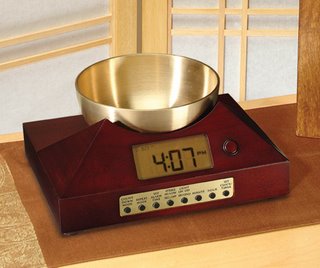 Zen Timepiece with brass singing bowl, a meditation timer
Now & Zen – Chime Alarm Clocks and Meditation Timers
1638 Pearl Street
Boulder, CO 80302
(800) 779-6383
Posted in Bamboo Chime Clocks, Meditation Timers, Meditation Tools, mindfulness practice, Now & Zen Alarm Clocks, Well-being, Zen Timers
 Switch Your Chime Alarm Clock On to Calm Down Calm yourself for sleep. Stress—from a job, or relationships, or impossibly high expectations—creates an inability to switch off at night, and lack of sleep makes us irritable, emotional, and unable to think clearly. “I tell my patients to take five minutes every few hours to calm, breathe, and bring the buzz down,” says Catherine Darley, MD, founder of the Institute of Naturopathic Sleep Medicine in Seattle. Another tip? Jotting thoughts down in a sleep diary can help you track what sets you of versus what sets you up for a good night’s rest.
Our Zen Clock’s long-resonating Tibetan bell-like chime makes waking up a beautiful experience – its progressive chimes begin your day with grace. When the clock’s alarm is triggered, the acoustic chime bar is struck just once … 3-1/2 minutes later it strikes again … chime strikes become more frequent over 10 minutes … eventually striking every 5 seconds until shut off. As they become more frequent, the gentle chimes will always wake you up – your body really doesn’t need to be awakened harshly, with a Zen Clock you’re awakened more gradually and thus more naturally.
adapted from Natural Solutions Magazine by Cara McDonald, 10/2010
 The Zen Alarm Clock Store -- Chime Alarm Clocks and Meditation Timers Now & Zen’s Chime Alarm Clock Store
1638 Pearl Street
Boulder, CO 80302
(800) 779-6383
Posted in Bamboo Chime Clocks

It was 1967, and the Indian meditation guru Maharishi Mahesh Yogi, dressed in white with long flowing black hair and a gray beard, beamed as he stood surrounded by four smiling young Beatles at the peak of their popularity.
George Harrison, clutching a sitar, John Lennon, Paul McCartney and Ringo Starr were on their way to a retreat in Wales led by the Maharishi, and the Hindu holy man was on his way to worldwide fame.
It has been more than 50 years since the Maharishi began teaching a technique known as Transcendental Meditation. He is now believed to be 91. On Tuesday, a close adviser said he has retreated into near silence and turned over the day-to-day running of his global network to aides.
“He is not as young as he once was,” adviser John Hagelin, an American physicist, said by telephone from the Dutch village of Vlodrop where the TM movement is now headquartered. “I think he probably has a more limited reserve of physical energy to draw upon. He was working … 20 hours a day for years.”
Transcendental Meditation, or TM, is a 20-minute twice daily routine in which the meditator silently focuses on a sound, or mantra, to induce relaxation and “dive into a state of pure consciousness.”
Most scientists agree TM can ease stress, high blood pressure, pain and insomnia. But some argue it is no more effective than many other mind-body relaxation techniques.
Movie director David Lynch once extolled the virtues of TM in a speech.
“Anger, stress, tension, depression, sorrow, hate, fear – these things start to retreat,” said Lynch, a longtime practitioner. “And for a filmmaker, having this negativity lift away is money in the bank. When you’re suffering, you can’t create.”
The Maharishi’s movement says some 6 million people have become practitioners.
But it was not until the Beatles visited his ashram in India in 1968 that the guru became an icon of the counterculture movement. John, Paul, George and Ringo came for spiritual instruction as they struggled to come to terms with the death of their manager Brian Epstein.
Other celebrities who followed the Maharishi’s teachings included singer Donovan, actress Mia Farrow and the Beach Boys.
The attention his famous followers focused on the Maharishi’s movement turned it into a global phenomenon with outposts in some 130 countries. For the last 17 years, he has run it from a former Franciscan monastery in a secluded forest near Vlodrop, an eastern Dutch village near the German border. He often spent hours on end speaking by video links to followers around the globe.
The Maharishi told senior aides at a Jan. 8 meeting in the Netherlands of his plan to withdraw from administrative duties and spend his time absorbed in the ancient Indian texts that underpin his movement. The announcement caught many followers off guard.
“He had been involved very dynamically administratively in his worldwide movement for over 50 years, so it’s quite a significant change to see him dive back purely into knowledge and let other people take care of the administration,” Hagelin said.
There is no one designated successor but many people have been trained for years to carry on the Maharishi’s various tasks, Hagelin said.
The Maharishi – a Hindi-language title for Great Seer – now spends his days in silence contemplating and preparing a commentary on the Vedas, a vast Sanskrit canon compiled some 3,500 years ago, from which he evolves solutions for today’s troubled world.
“I think everybody’s quietly feeling some sense of celebration that he’s finally going to complete his commentary on the Vedas, which probably will have a longer-term impact,” Hagelin said. “It’s a vitally important body of literature.”
adapted from SFGate.com, Mike Corder, Associated Press, 1/2008
 Meditation Timer Store in Downtown Boulder, CO  Meditation Timers with Chimes and Tibetan Singing Bowls Now & Zen’s Chime Timer Store
1638 Pearl St.
Boulder, CO 80302
(800) 779-6383
Posted in Uncategorized
 Meditation Some people find the quiet rhythms of meditation just plain annoying. When they try to empty their minds, all they can do is think about the Visa bill that’s due, the kids’ next soccer game, the sneaking suspicion that they’re about to be broken up with. For folks like these, there’s another option. It’s called mindfulness meditation, also known as Vipassana, and according to researchers at the HealthEmotions Research Institute at the University of Wisconsin, it may bring just as many health benefits as more mainstream meditation. In Vipassana, you don’t exactly embrace your anxious thoughts, but you don’t have to push them out the door and move the dresser in front of it, either. Instead, you observe and appreciate the distracting thoughts for what they are: part of life, part of the moment. By not resisting, you can quiet your mental chatter for a time, gain some perspective, and continue to move toward a more relaxed state.
To test the effect of mindfulness meditation on overall health, the researchers assembled 25 members of a study group that was trained in the ancient practice by researcher Jon Kabat-Zinn, who tailored it as a remedy for stress back in the 1970s. Before starting to meditate, each person was given a flu shot to stimulate the immune system; that way re-searchers could compare their bodily responses pre- and post-meditation. Sixteen people who didn’t meditate were given flu shots and included for comparison. The change was dramatic: The study group developed a significantly larger army of flu antibodies than did the nonmeditators. Also, tests showed increased electrical activity in their frontal lobes, the part of the brain associated with happiness and other positive emotions. Next, the researchers plan to study a group that’s been meditating mindfully for 30 years. In the meantime, don’t let unwelcome thoughts keep you from giving this technique a try.
Although meditation can be done in almost any context, practitioners usually employ a quiet, tranquil space, a meditation cushion or bench, and some kind of timing device to time the meditation session. Ideally, the more these accoutrements can be integrated the better. Thus, it is conducive to a satisfying meditation practice to have a timer or clock that is tranquil and beautiful. Using a kitchen timer or beeper watch is less than ideal. And it was with these considerations in mind that we designed our digital Zen Alarm Clock and practice timer. This unique “Zen Clock” features a long-resonating acoustic chime that brings the meditation session to a gradual close, preserving the environment of stillness while also acting as an effective time signal.
adapted from Natural Solutions, May, 2003
 Meditation Timers with Chimes from Now & Zen Now & Zen’s Chime Timer for Meditation Store
1638 Pearl Street
Boulder, CO 80302
(800) 779-6383
Posted in Chime Alarm Clocks, Meditation Timers, Meditation Tools, mindfulness practice, Now & Zen Alarm Clocks, Well-being
 How to Improve Your Brain - Use Your Meditation Timer Want to build a better brain? Ramp up your spiritual practice, says Andrew Newberg, a neuroscientist at the University of Pennsylvania. Meditation and prayer can improve your physical, intellectual, and emotional well-being and may even slow the brain’s aging process.
Newberg, who is also the director of the Center for Spirituality and the Mind, is the author of four books, including the recently released “How God Changes Your Brain,” which discusses the results of brain scans that he and his team conducted on more than 100 meditating or praying people. The research shows that the physical and emotional benefits of spiritual observances dramatically accrue over years of practice, but even recent converts exhibit healthier brains — in one study Newburg’s team scanned the brains of people who had never meditated before, then taught them simple meditative methods. After eight weeks of meditating 12 minutes a day, an evaluation showed considerable improvement in memory scores and a measurable decrease in anxiety and anger.
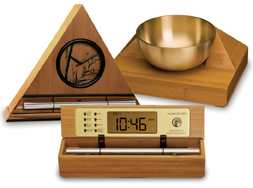 Chime Timers and Meditation Clocks adapted from SFGate.com by David Ian Miller, 4/2009
Using a kitchen timer or beeper watch is less than ideal. And it was with these considerations in mind that we designed our digital Zen Alarm Clock and practice timer. This unique “Zen Clock” features a long-resonating acoustic chime that brings the meditation session to a gradual close, preserving the environment of stillness while also acting as an effective time signal.
Now & Zen’s Meditation Chime Clocks & Timers
1638 Pearl Street
Boulder, CO 80302
(800) 779-6383
Posted in Bamboo Chime Clocks
 Meditation Produces Big Changes in Your Brain The benefits of meditation can’t be called new. For decades the practice has been endorsed, even by mainstream medicine, as a proven means to reduce stress and produce relaxation. In fact, if it were not for “the relaxation response,” a sanitized version of Eastern meditation that was popularized thirty years ago, it is doubtful that a secular society could be persuaded that meditation is real. Until recently, code words like “peacefulness” and “serenity” went about as far as anyone could go without seeming to bring religion in through the back door.
Now a new study from Massachusetts General Hospital has made headlines by showing that as little as eight weeks of meditation produces changes in various areas of the brain associated, not simply with feeling calmer, but with improved sense of self, empathy, and memory. Again this isn’t exactly new. Since the Seventies a change in brain waves, particularly alpha waves, was associated with the regular practice of meditation. Today, with far more sophisticated brain imaging, researchers can pinpoint where these changes are taking place with remarkable precision.
The short period of time needed to produce benefits surprised everyone. Brain scans of Buddhist monks had already shown dramatic alteration of gamma waves in the prefrontal cortex, a region associated with higher cognitive responses as well as moral feelings like compassion. But learning that a life-long meditator produced gamma waves at 80 cycles per second instead of the usual 40, although fascinating to neuroscientists, still kept meditation far out of reach of busy, secular Westerners. Now we can say, without fear of seeming “too Eastern,” that meditation sharpens the mind and produces benefits everyone would want. The old bugaboo that navel gazing makes you passive and “too peaceful” can be banished once and for all.
If you back away and look at the bigger picture, what you see is startling. There is a direct path that begins in the mind — with meditation, mindfulness, or more basic things like beliefs and emotions — and then the path leads to the genes, where signals are sent that modify the brain cell, which in turn sends its own signals in the form of neurotransmitters to every cell in the body. The reason that eight weeks is enough to cause significant changes in the brain is that the underlying circuitry that connects mind, genes, and brain operates every second of our lives. Ultimately, I’m confident that the results will spread even farther. We will discover that a person’s awareness balances and controls almost any bodily process you can name. The old phrase, “biology is destiny,” will have to be seriously re-examined. A good replacement would be “consciousness is destiny,” which is the guiding reason that meditation arose in the first place. I foresee enormous opportunities for personal freedom here. Instead of being dictated to by your genes and chemical processes in the brain, it may turn out that you are the author of your own life, capable of change, healing, creativity, and personal transformation. Who wouldn’t want to be free to write the program that runs brain and body? Such has been the spiritual promise for thousands of years. It’s time that modern society woke up and realized that the promise still holds good.
 Meditation Timer with Soothing Chime Although meditation can be done in almost any context, practitioners usually employ a quiet, tranquil space, a meditation cushion or bench, and some kind of timing device to time the meditation session. Ideally, the more these accoutrements can be integrated the better. Thus, it is conducive to a satisfying meditation practice to have a timer or clock that is tranquil and beautiful. Using a kitchen timer or beeper watch is less than ideal. And it was with these considerations in mind that we designed our digital Zen Alarm Clock and practice timer. This unique “Zen Clock” features a long-resonating acoustic chime that brings the meditation session to a gradual close, preserving the environment of stillness while also acting as an effective time signal. The Digital Zen Clock can be programmed to chime at the end of the meditation session or periodically throughout the session as a kind of sonic yantra. The beauty and functionality of the Zen Clock/Timer makes it a meditation tool that can actually help you “make time” for meditation in your life.
adapted from San Francisco Chronicle by Deepak Chopra – the author of over 60 books on health, success, relationships and spirituality, including “The Soul of Leadership.” Feb. 2011
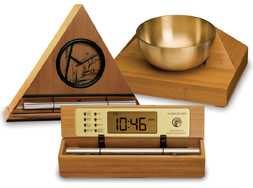 Now & Zen's Family of Chime Timers and Alarm Clocks Now & Zen’s Chime Timer Store
1638 Pearl Street
Boulder, CO 80302
(800) 779-6383
Posted in Uncategorized
« Previous Page — « Previous Entries
Next Entries » — Next Page »
|
|
|
|